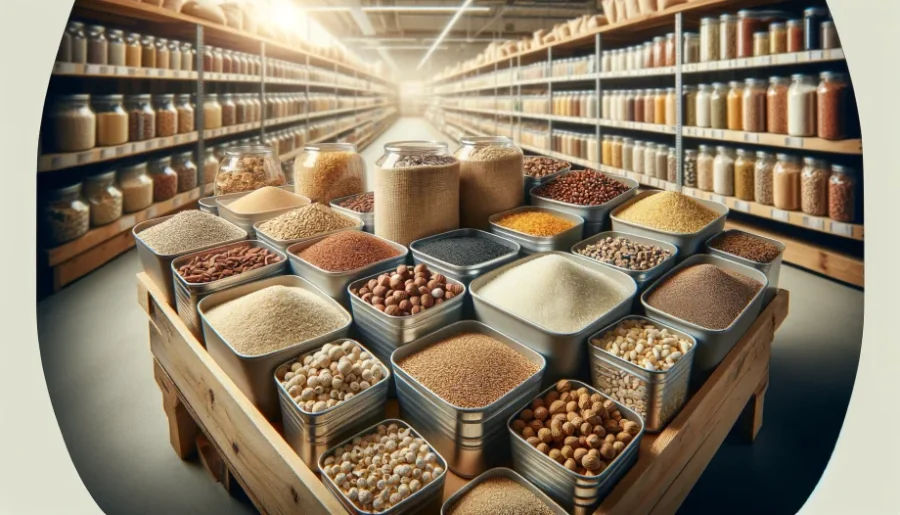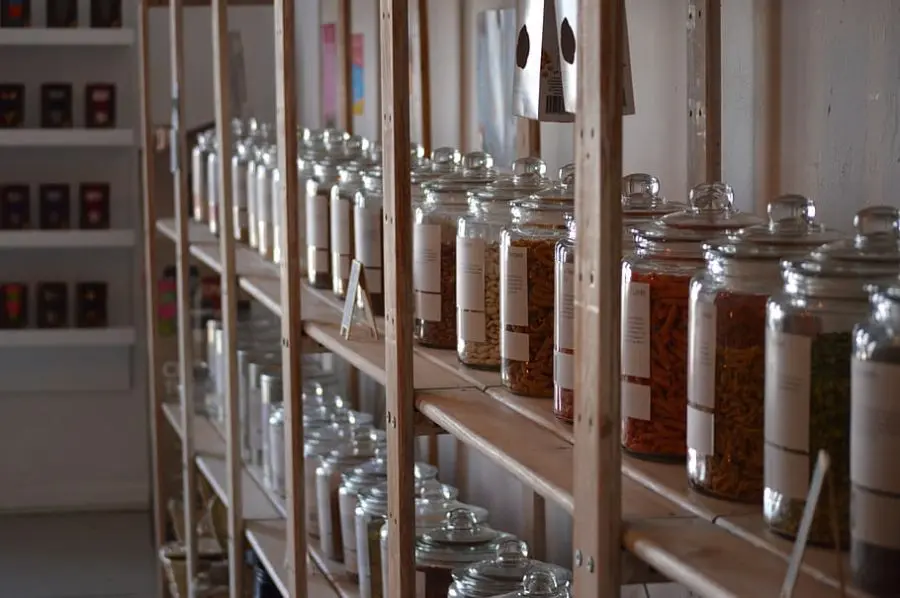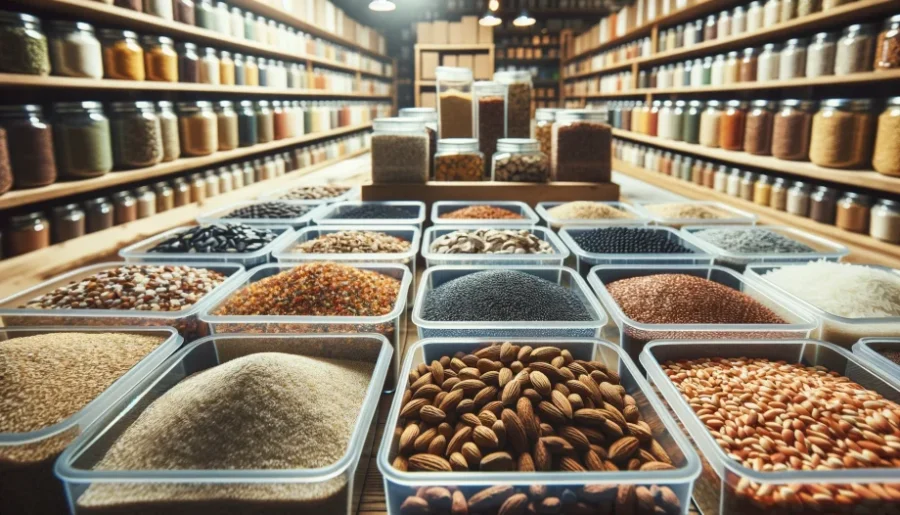
Discover the bulk buying zero-waste shopping guide for a sustainable lifestyle. Learn how to shop smarter, reduce waste, and save money with our eco-friendly tips.
Key Takeaways:
- Bulk buying zero-waste shopping involves purchasing products in bulk quantities without unnecessary packaging.
- This approach reduces waste, saves money, and supports a sustainable lifestyle.
- By choosing bulk buying, consumers can minimize their environmental impact and contribute to a healthier planet.
Welcome to our bulk buying zero-waste shopping guide, where we’ll show you how to shop sustainably, reduce packaging waste, and embrace a greener lifestyle.
Join us as we explore the benefits of bulk buying and provide practical tips for making your shopping routine more eco-friendly.
Bulk Buying: Zero-Waste Shopping Guide

Bulk buying is a cornerstone of the zero-waste lifestyle, allowing consumers to purchase products without unnecessary packaging.
By focusing on this approach, shoppers can significantly reduce their environmental footprint while also enjoying economic benefits.
This guide will explore the advantages of bulk buying and offer practical tips for incorporating this sustainable practice into your everyday shopping routine.
How to Buy Bulk Items?
Finding Bulk Stores: Start by locating stores in your area that offer bulk options. Health food stores, co-ops, and some supermarkets have bulk sections where you can find a variety of items.
Bring Your Own Containers: To maximize the zero-waste benefits, bring your own reusable containers, bags, and jars to fill up with bulk items.
Plan Your Purchases: Make a list of the items you need and plan your meals around them to avoid overbuying and ensure that you only purchase what you’ll use.
Bulk Purchasing Benefits
Cost-Effective: Bulk buying often provides a lower cost per unit, leading to significant savings over time.
Reduces Waste: One of the primary benefits of bulk buying is the reduction in packaging waste, which aligns with the principles of a zero-waste lifestyle.
Customizable Quantities: Bulk buying allows you to purchase exactly the amount you need, reducing food waste and promoting mindful consumption.
Why Do People Buy in Bulk?
Economic Savings: Many consumers are attracted to bulk buying because of the potential for cost savings.
Environmental Impact: A growing number of shoppers are choosing to buy in bulk as a way to reduce their environmental footprint by minimizing packaging waste.
Convenience: Bulk buying can also offer convenience, as it reduces the frequency of shopping trips and allows consumers to stock up on staples.
Tips for Successful Bulk Shopping
Start Small: Begin with a few items to get accustomed to the process.
Label and Organize: Keep track of your purchases by labeling containers with purchase dates and storing items properly.
Be Mindful of Expiration Dates: Regularly check expiration dates and rotate your stock to use older items first.
In a Nutshell:
Bulk buying is an effective way to embrace a zero-waste lifestyle, offering both environmental and economic benefits.
By starting small, planning ahead, and being mindful of your purchases, you can successfully incorporate bulk buying into your shopping routine.
Advantages of Bulk Buying

Cost-Effective: Buying in bulk often results in lower per-unit costs, which can lead to significant savings over time.
For items that you use regularly, such as grains, nuts, or household supplies, bulk buying can be a smart financial decision.
Reduces Waste: One of the primary benefits of bulk buying is the reduction in packaging waste.
When you buy in bulk, you can avoid the excess packaging that often comes with individually wrapped products.
This not only helps reduce your environmental footprint but also aligns with the principles of a zero-waste lifestyle.
Customizable Quantities: Bulk buying allows you to purchase exactly the amount you need, which can help minimize food waste.
Whether you need a small amount of a specific spice or a larger quantity of a staple item, bulk sections offer the flexibility to buy according to your needs.
How to Get Started with Bulk Buying
Find Bulk Stores: Start by locating stores in your area that offer bulk options. Many health food stores, co-ops, and even some larger supermarkets have bulk sections where you can find a variety of items, from dry goods to liquid products.
Bring Your Own Containers: To truly embrace zero-waste shopping, bring your own containers, bags, and jars when you shop in bulk.
Make sure they’re clean and dry, and don’t forget to weigh them before filling them up.
Plan Ahead: Before you go shopping, make a list of the items you need and plan your meals around them.
This will help you avoid impulse buys and ensure that you only purchase what you’ll use.
By following these tips, you can start incorporating bulk buying into your shopping routine and enjoy the benefits of a more sustainable and cost-effective lifestyle.
Bulk purchasing or mass buying is the purchase of much larger quantities than the usual, for a unit price that is lower than the usual. Wholesaling is selling goods in large quantities at a low unit price to retail merchants. Wikipedia
Tips for Successful Bulk Shopping

Embarking on a bulk shopping journey can be rewarding, but it requires a bit of strategy to ensure success.
These tips are designed to help you navigate bulk buying effectively, making the most of your purchases while maintaining freshness and minimizing waste.
Start Small
- Ease Into It: Begin with a few bulk items that you use regularly. This allows you to get comfortable with the process without feeling overwhelmed.
- Gradual Expansion: As you become more accustomed to bulk shopping, you can slowly increase the variety and quantity of items you buy in bulk.
Label and Organize
- Date Marking: Label your containers with the purchase or packaging date to keep track of freshness.
- Proper Storage: Store your bulk items in airtight containers in a cool, dry place to maintain their quality and extend their shelf life.
Be Mindful of Expiration Dates
- Regular Checks: Periodically check the expiration dates of your bulk items to ensure they’re still good to use.
- Stock Rotation: Use older items first and rotate your stock to prevent any from going to waste.
By following these tips, you can make your bulk shopping experience more efficient and enjoyable, while also contributing to a more sustainable lifestyle.
Overcoming Challenges
While bulk buying offers numerous benefits, it’s not without its challenges.
Limited selection and storage space are common concerns for those embarking on a zero-waste shopping journey.
In this section, we’ll explore strategies to navigate these obstacles and make the most of your bulk buying experience.
Limited Selection
- Research and Plan: Before heading to the store, research the available bulk options and plan your shopping list accordingly. This can help you make the most of the selection that is available.
- Seek Alternatives: If your local bulk store has a limited selection, consider exploring other stores or online options. Farmers’ markets, co-ops, and specialty stores often offer a wider range of bulk items.
- Advocate for More Options: Don’t hesitate to request additional bulk items from your local store. Your feedback can help increase the variety of products offered in bulk.
Storage Space
- Creative Solutions: Utilize vertical space with shelves or hanging organizers to store your bulk items. Stackable containers can also help maximize storage in small areas.
- Multi-Purpose Furniture: Consider furniture with built-in storage, such as ottomans or coffee tables with compartments, to discreetly store bulk items.
- Declutter and Organize: Regularly decluttering your pantry and kitchen cabinets can free up space for your bulk purchases. Using clear containers can help you keep track of what you have and what needs to be used up.
By addressing these challenges with thoughtful planning and organization, you can successfully incorporate bulk buying into your zero-waste lifestyle, even in small spaces.
Bulk Buying: Zero-Waste Shopping Guide FAQs
Bulk buying is a smart way to shop for household essentials while minimizing waste and saving money.
Here are some frequently asked questions to help you get started with bulk buying for a zero-waste lifestyle.
Q: What is the meaning of bulk buying?
A: Bulk buying refers to purchasing large quantities of an item at once, often with lower per-unit costs, resulting in savings and reduced packaging waste.
Q: Is it actually cheaper to buy in bulk?
A: Yes, buying in bulk can be cheaper as it typically offers a lower price per unit compared to smaller quantities. This can lead to significant savings over time, especially for frequently used items.
Q: How do I start bulk buying?
A: To start bulk buying, identify the items you use regularly that have a long shelf life. Look for stores with bulk sections, bring your own containers, and stick to your shopping list to avoid overbuying.
Q: Should I buy perishable items in bulk?
A: Generally, it’s best to avoid buying perishable items like fruits and vegetables in bulk unless you plan to consume or preserve them quickly, as they can spoil before you use them all.
Q: Can bulk buying help reduce my carbon footprint?
A: Yes, bulk buying can reduce your carbon footprint by minimizing packaging waste and reducing the frequency of shopping trips, which in turn lowers transportation emissions.
Q: Are there any downsides to buying in bulk?
A: Some downsides include the need for upfront payment, storage space, and the risk of overuse or waste if products expire before use. It’s important to plan and buy only what you need.
Q: What are some good items to buy in bulk?
A: Good items to buy in bulk include non-perishable foods like rice, pasta, and canned goods, as well as household supplies like paper towels, batteries, and cleaning products.
Bulk Buying Conclusion
As we wrap up our guide on bulk buying for a zero-waste lifestyle, it’s clear that this approach to shopping offers numerous benefits for both the environment and our wallets.
By embracing bulk buying, we can significantly reduce packaging waste, save money, and contribute to a more sustainable future.
Key Points of Bulk Buying
- Environmental Impact: Bulk buying helps reduce packaging waste and minimizes our carbon footprint.
- Cost Savings: Purchasing items in bulk often results in lower per-unit costs, leading to long-term savings.
- Customizable Quantities: Bulk buying allows you to purchase only what you need, reducing food waste and promoting mindful consumption.
Taking the First Step
- Start Small: Begin your bulk buying journey with a few items to get accustomed to the process.
- Find the Right Store: Locate stores in your area that offer a good selection of bulk items.
- Bring Your Own Containers: Embrace the zero-waste aspect of bulk buying by using reusable containers and bags.
Sharing Your Experiences
- Connect with Others: Share your bulk buying experiences with friends, family, and online communities to inspire others.
- Learn from the Community: Exchange tips and ideas with fellow zero-waste enthusiasts to enhance your bulk buying practices.
By taking the first step towards bulk shopping, you’re not only making a positive impact on the environment but also setting an example for others to follow.
Learn more: Mastering Zero-Waste Living: 7 Easy Tips and Tricks
Embrace the journey, share your experiences, and let’s collectively work towards a more sustainable and waste-free world.
Resources for Bulk Buying: Zero-Waste Shopping Guide
To help you dive deeper into the world of bulk buying and zero-waste living, we’ve compiled a list of authoritative resources.
These guides and articles provide valuable insights and tips to enhance your bulk shopping experience.
Guides and Articles
- SoFi’s Beginner’s Guide to Buying in Bulk: A comprehensive guide that covers the basics of bulk buying, including how to get started, what to buy, and how to store bulk items.
- NerdWallet’s Tips for Bulk Buying: Offers practical tips and strategies for saving money and reducing waste through bulk buying.
- Environmental Protection Agency (EPA) – Reduce, Reuse, Recycle: Provides information on how reducing, reusing, and recycling can help conserve resources, reduce pollution, and save money.
- Zero Waste Home: A blog by Bea Johnson, a pioneer of the zero-waste movement, offering tips and inspiration for living a waste-free life.
- Bulk Is Green Council: An organization dedicated to promoting the environmental and economic benefits of bulk foods.
By exploring these resources, you can gain a better understanding of bulk buying and its positive impact on the environment and your budget.
Whether you’re a seasoned zero-waste shopper or just starting out, these guides offer valuable insights to help you make more sustainable choices.







